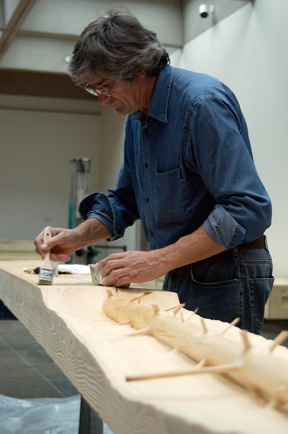Giuseppe Penone
Penone is associated with the Italian movement Arte Povera. Creation, metamorphosis and the passage of time are important concepts in his work. His sculptures refer to the mysteries of nature: flow, transformation, growth and erosion. Many of his works deal with the fleeting nature of man’s existence.
In 1967 he began fusing natural and synthetic elements in order to influence the growth process. For example, his work La mano affronda nel tronco dell’albero (The Hand Fused with the Tree Trunk), executed in Piemonte in 1968, consists of a bronze hand gripping the trunk of a sapling. Over the years tree and the hand have become fused, illustrating man’s symbiotic relationship with nature. Around 1969 he began work on a series entitled Alberi (Trees), in which he exposed the original trees within wooden beams. He has also made casts using parts of his body. In 1972 he grew pumpkins inside a mould of his face, so that they took on the same form, and in 1978 he cast his own breath. Penone places great importance on the physical contact between the artist and his materials. He makes tangible things that are not tangible in reality.
Giuseppe Penone has always remained true to the methods and principles of Arte Povera. The sculpture he created for Rotterdam in 2001 relates to the same concept with which he began his career and illustrates his vision of sculpture: “A sculptor’s task is to reveal the latent image in nature.”
